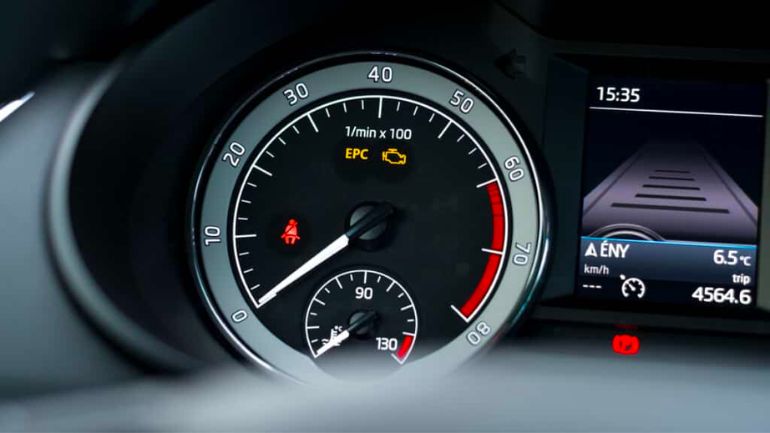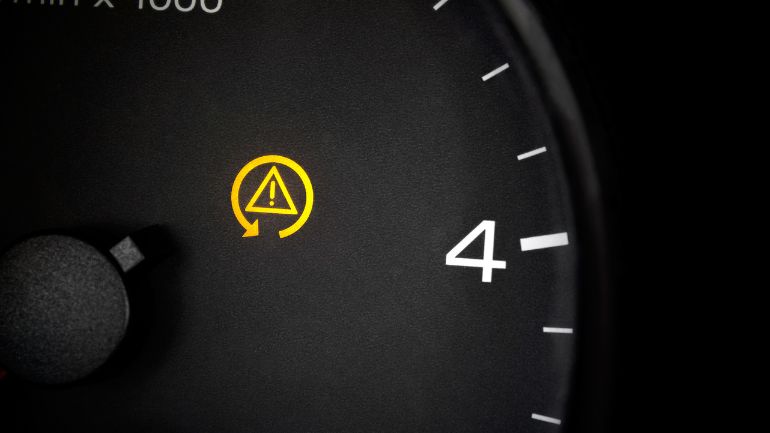Every car has what’s called an electronic power control, or EPC, light. If this light comes on while you’re driving, it means there’s a problem with your car’s electronic throttle control system.
In other words, your car’s computer is telling you that there’s something wrong and you need to get it checked out.
But what could cause your EPC light to come on? Can low oil cause EPC light?
Yes, an excessively low amount of oil can cause your car’s Electric Power Control (EPC) light to glow. This is a way to notify the driver of a potential problem.
In this article, I’ll discuss how low oil can affect your car, other reasons that can cause the EPC light to come on, and what you should do if your EPC light comes on.

Table of Contents
Can Low Oil Cause EPC Light?
If the amount of oil in your car is too low, it can cause your car’s EPC light to come on.
The oil level sensor is located in the oil pan and when the level of oil gets low, the sensor sends a signal to the computer to turn on the EPC light.
Generally, if the EPC light is caused by low oil, you’ll also find the oil change light on to help you diagnose the issue.
Maintaining a proper oil level is crucial for both your car’s engine and lubricated parts.
Without enough amount of oil and lubrication, there will be more friction, and the car’s parts will start to wear and tear. This in turn can lead to damage to the engine in a long run.
EPC light, although annoying, helps you avoid such potential damage by notifying you when the oil level is low.
So, if your EPC light comes on, make sure to check the oil level and top it off if necessary. Other than that, here are a few other reasons that can cause your EPC light to come on.
What Can Cause The EPC Light To Come On? 9 Basic Reasons
Electric Power Control (EPC) light is not limited to low oil and there are many other reasons that can cause it to glow. Here are seven different problems that can cause the EPC light to come on.
Failed throttle body
The throttle body is responsible for controlling the amount of air that goes into the engine. If it’s not working properly, it can cause all sorts of problems, including triggering the EPC light.
Additionally, a dirty or failed Mass Air Flow (MAF) sensor (responsible for measuring the amount of airflow going into the engine) can also cause the EPC light to come on.
Broken ABS ring
The ABS ring is located on the wheel and helps the computer to measure the speed of the wheels.
Since it’s placed underneath your vehicle, it’s susceptible to collecting dust or damage. If it’s damaged or broken, it can cause the EPC light to come on.
If there’s a problem with ABS rings, you will also notice the ABS light glowing on your car’s dashboard.
Additionally, while driving at low speeds and braking harder than usual, you might hear a banging noise.
Malfunctioning of the motor
In case there’s an issue with the motor that controls the electronic throttle body, it can cause the EPC light to come on.
If the motor is causing the problem, it may result in a few others issues such as trouble driving or odd noises and smells coming from the car. It could also lead to an oil stain or a clogged cooling system.
Moreover, gas consumption might go up significantly, as well as you would notice a drop in engine power.
Replacing the motor can be expensive so getting it fixed should be your top priority.
Problem with traction control

Although it’s not very common, a problem with the traction control system can also cause the EPC light to come on.
If there’s something wrong with the traction control, you’ll notice that your car is slipping or fishtailing when you’re trying to accelerate.
Additionally, while going over bumps, you might hear a rattling noise.
Faulty cruise control
Your car uses the same throttle position sensor (TPS) for both the cruise control and EPC system.
So, if there’s an issue with the TPS, it can trigger both systems and cause the EPC light to come on.
A faulty TPS can cause other problems as well, such as the cruise control not working properly or the car jerking when you’re accelerating.
Damaged ABS sensor
As I’ve mentioned before, the ABS sensor is responsible for measuring the speed of the wheels. If it’s damaged or not working properly, it can cause the EPC light to come on.
The first way to tell that there is an issue with the ABS sensor is by checking if the light on the dashboard is illuminated.
If it is, then you know that there is definitely an issue with your car’s ABS system. Now, if the sensor itself is broken, you may feel a pumping sensation in the brake pedal when depressing it.
Power steering failure
This might be a little hard to digest but a power steering failure can also cause the EPC light to come on.
A power steering failure can be marked by a number of things, such as an abnormal noise coming from the steering wheel, vibrations in the steering wheel, or difficulty in turning the wheel.
Faulty fuel sensor or low engine oil
Another common reason for the EPC light to come on is a faulty fuel sensor or low engine oil.
A faulty fuel sensor can cause a number of problems, such as the car stalling or jerking. Additionally, you might also notice that your gas mileage has gone down significantly.
As for low engine oil, it’s pretty self-explanatory. If the oil level is low, it can cause all sorts of problems, including triggering the EPC light.
Failed brake pedal switch
The brake pedal switch is responsible for sending a signal to the computer when the brake pedal is depressed. If it’s not working properly, it can cause the EPC light to come on.
If the brake pedal switch is broken, it indicates two significant problems; one if the switch is to blame, the vehicle won’t start at all.
And secondly, it might cause the brake lights to be turned on continuously, even when the brake pedal isn’t being pressed or they may not turn on at all.
In addition to the EPC light, a broken brake pedal switch can also cause the cruise control to stop working and the car to stall when coming to a stop.
There are a number of different reasons that can cause the EPC light to come on in your car.
What To Do When EPC Light Comes On?
The first thing you should do is to avoid driving the car any longer than it’s needed and bring your vehicle to a certified dealership or service center as soon as possible.
This way, a trained technician can diagnose and fix the problem for you. While driving, if you notice any of the above signs we mentioned, you can share them with the mechanic and help them quickly identify and fix the problem.
If you know your way around cars and would like to check the problem yourself, I’d recommend using an OBDII scanner.
- [Easy to Use for Car Owners] - FOXWELL NT201 obd2 scanner is designed...
- [Accurate Diagnosis] - Quickly scan engine system in seconds, reading...
- [One-Key Emissions Test] - FOXWELL NT201 auto code scanner gives you...
- [Comprehensive OBDII Modes] - Equipped with full OBDII modes, the...
- [Wide Vehicle Coverage] - Works with all OBDII/EOBD compliant cars,...
This will help you pull up any error codes that might be stored in the computer and give you a better idea as to what is causing the EPC light to come on.
Is It Risky To Drive With The EPC Light On?
Generally speaking, it’s not recommended to drive with the EPC light on as it could indicate a serious problem with your car. The ideal solution would be to get it fixed right away.
However, if you absolutely have to drive the car, I’d recommend taking it easy and avoiding any sudden stops or accelerations.
Additionally, keep an eye out for any other signs that might indicate a problem with your car.
Frequently Asked Questions
Can low battery cause EPC light?
If there’s a significant dip in your car’s baseline voltage, it can result in the EPC light coming on. A few things that can cause this are a dead battery, a failing alternator, or even just a bad battery cable.
Why does my EPC light come on when I accelerate?
If there’s a problem with your vehicle’s throttle system, it can cause the EPC light to come on. The throttle system includes a few crucial parts such as the accelerator pedal, fuel injection throttle body, traction control, cruise control, and other systems.
Why is my car shaking and EPC light on?
A vacuum leak or a damaged motor mount can cause your car to shake and low fuel or ignition system fault can be the reasons behind the EPC light glowing.
What causes EPC to light on VW?
In Volkswagen vehicles, a faulty throttle body or mass airflow sensor is a common cause for the EPC light to come on. Other reasons could be a faulty fuel sensor, low engine oil, or a failed brake pedal switch.
What causes EPC light on Audi?
In Audi cars, a faulty throttle system is the most common reason for the EPC light to come on. Other potential causes could be a problem with the mass airflow sensor, fuel sensor, or ignition system.
How would I reset my Audi EPC light?
A temporary way to reset the EPC light on Audi is to: turn on your Audi, slowly step on the gas pedal all the way to the floor, hold it on the floor and turn off the ignition, release the gas pedal all the way to the rest position and turn on the ignition switch.
Can a flawed alternator cause EPC light?
A failing alternator can cause the EPC light to come on if it’s not providing enough power to run all the electrical components in your car. Additionally, it can also cause the battery light to come on as well.

Robert Bacon is a car nerd and automotive lover who has dedicated his life to understanding the inner workings of vehicles. He holds a degree in mechanical engineering and has spent years working as a mechanic and engineer for some of the world’s top car companies. In his spare time, he enjoys writing about cars on this blog and tinkering with his 2016 Toyota Mirai in his garage.
